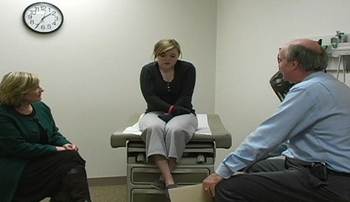It’s estimated that more than half of all U.S. mental health care takes place at the primary care level and that percentage jumps considerably in rural areas where there often are no mental health practitioners for hundreds of miles.
New online training modules have been designed by the Behavioral Health Education Center of Nebraska (BHECN) to help primary care providers better treat patients with mental health issues.
 |
The online training modules designed by the Behavioral Health Education Center of Nebraska are meant to help primary care providers better deal with patients who have depression and other mental health issues. |
Resource for a major issue
BHECN — a UNMC program that aims to improve behavioral health training and education throughout the state – has created the training modules to help primary care providers treat depression in adolescents, adults and geriatric patients.
The adolescent module was released in September and has been viewed by hundreds of practitioners from around the world. The adult and geriatric modules will be released later this winter.
More comfortable providers
The goal is to help primary care providers get more comfortable as they prescribe medications and refer patients to psychiatrists and therapists.
This is particularly timely in adolescents as black box warnings on antidepressants about increased suicidal thoughts being related to their use have made many primary care physicians leery when it comes time to prescribe the medications.
A convenient training method
In the modules, practitioners watch video, review text and graphs and take quizzes designed to teach them more about depression treatment. Primary care providers can receive continuing education credits for the training.
“The challenges in mental health are significant and the consequences for not meeting these challenges are great,” Dr. Liu said. “We want our training modules to provide skills and insight needed to help address this great need.”
Wow! What a great contribution to healthcare! This is an extremely worthwhile endeavor that will help our society as a whole.